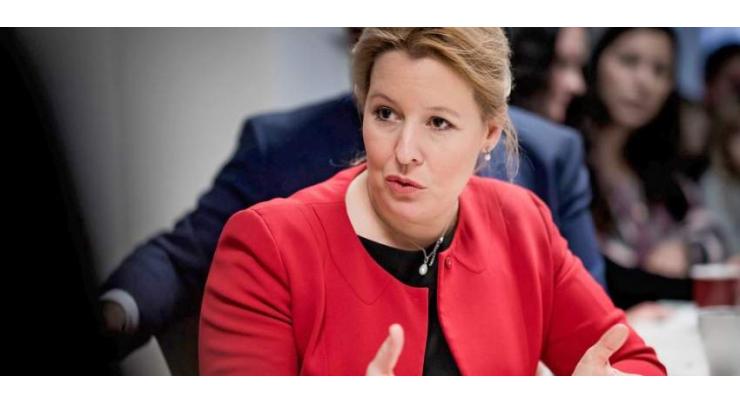
Germany Unveils Plan To Boost Gender Equality
Sumaira FH Published July 08, 2020 | 11:33 PM

Germany adopted a national strategy on Wednesday to promote gender equality for the first time in its history, aiming to put an end to years of sluggish progress on equal rights and treatment for women
Berlin, (APP - UrduPoint / Pakistan Point News - 8th Jul, 2020 ) :Germany adopted a national strategy on Wednesday to promote gender equality for the first time in its history, aiming to put an end to years of sluggish progress on equal rights and treatment for women.
The strategy sets out goals for all government departments, including closing the gender pay gap and better representation for women in business and politics, Families Minister Franziska Giffey said.
"This is the first equality strategy in the history of the Federal Republic of Germany that has been coordinated and agreed across all departments," Giffey said, describing the strategy as a "milestone".
The plan includes a focus on work-life balance and the fact that women are more likely to work part-time or not at all because of family commitments.
It also focuses on increasing the number of women in management positions, including in the civil service, and on better representation in politics.
The ruling conservative CDU party has this week already shown movement on the issue, with party leader Annegret Kramp-Karrenbauer announcing new binding quotas that will see women filling at least 50 percent of senior positions at a local level by 2025.
The government is also working on a strategy to increase the number of women on executive boards so that an existing 30 percent quota will apply to 600 companies instead of 105 currently, Giffey said.
- Below European average - Despite being led by a female chancellor, Germany sits below the European average when it comes to equality between men and women, according to a 2019 index from the European Institute for Gender Equality.
Women earn an average 20 percent less than men and occupy only around 15 percent of executive board positions.
Representation of women in the Bundestag, Germany's lower house of parliament, is currently at its lowest for 20 years, and more than 90 percent of local mayors are male, Giffey said.
Historically, gender equality was a particular sticking point in the former West Germany, where women still needed permission from their husbands to work until 1977.
Shortly before reunification, just over half of women in West Germany were employed in the workforce, compared with 91 percent of women in communist East Germany.
The coronavirus crisis has only exacerbated gender disparities, according to some observers.
"It is quite obvious that women have borne the main burden in families," judge Elke Buedenbender, the wife of German President Frank-Walter Steinmeier, said in an interview with the Funke media group in June.
"It seems to me that in the time of coronavirus, women have been more prepared to fall back into traditional roles than men have to take a step back from their careers," she said.
Related Topics
Recent Stories

ICC Womens T20 World Cup Qualifier, Match 2: Ireland Women open with Comfortable ..

Robinson, bowlers help New Zealand go 2-1 up against Pakistan

Shahzeb Chachar to hold khuli kachehri on April 26

Heatwave amid Israel's aggression in Gaza brings new misery, disease risk

Tourism must change, mayor says as Venice launches entry fee

Court adjourns Judicial Complex attack case till May 17

Nasreen Noori’s book ‘Popatan Jahra Khwab’ launched

Wafaqi Mohtasib inspection team visits Excise and taxation office

AJLAC announces 5th Conference titled ‘People’s Mandate: Safeguarding Civil ..

Pak-US officials engage to enhance trade, investment ties

IBCC to promote educational excellence, expand regional presence

Pakistani 'Blue Helmets' serving UN Peacekeeping Mission in DR Congo set to leav ..
More Stories From World
-
Slot 'confident' of Liverpool job as 'negotiations' take place
6 hours ago -
Google parent Alphabet's Q1 profits beat estimates: company
6 hours ago -
WADA asks 'independent prosecutor' to examine Chinese swimmers case
6 hours ago -
New York court overturns Harvey Weinstein sex crime conviction
6 hours ago -
Bagnaia and Spanish rivals chase victory at Jerez
8 hours ago -
Russian, Ukrainian strikes kill at least 10 in frontline regions
8 hours ago
-

Heatwave amid Israel's aggression in Gaza brings new misery, disease risk
8 hours ago -

Tourism must change, mayor says as Venice launches entry fee
8 hours ago -

Pakistani 'Blue Helmets' serving UN Peacekeeping Mission in DR Congo set to leave after 20 years of ..
9 hours ago -

Putin says plans to visit China in May
9 hours ago -

US reinstates open internet rules rescinded under Trump
9 hours ago -

Honda announces US$11 bn EV battery and vehicle plant in Canada
9 hours ago





